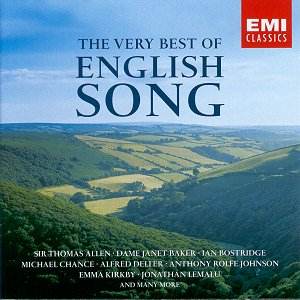




BUY NOW
CD1
Ralph VAUGHAN WILLIAMS (1872-1958): ‘Linden Lea’ [2’51"]
John IRELAND (1879-1962): ‘The Salley Gardens’ (Songs Sacred and Profane, No. 4) [2’14"]
Sir Hubert PARRY (1848-1918): ‘O mistress mine’ (English Lyrics Set II, No. 1) [2’14"]
Roger QUILTER (1877-1953): ‘Love’s Philosophy’, Op. 3, No. 1 [1’27"]
Dame Janet Baker (mezzo soprano); Gerald Moore (piano)
Roger QUILTER: ‘Now sleeps the crimson petal’, Op. 3, No. 2 [2’11"]
Graham PEEL (1877-1937): ‘Bredon Hill’ [3’44"]
Sir Thomas Allen (baritone); Geoffrey Parsons (piano)
George BUTTERWORTH (1865-1918): ‘Loveliest of trees’ (A Shropshire Lad, No. 1) [2’51"]
Ivor GURNEY (1890-1937): ‘Down by the Salley Gardens’ [2’34"]; ‘Black Stitchel’ [2’10"]
Peter WARLOCK (1894-1930): ‘My Own Country’ [2’34"]; ‘Passing By’ [2’30"]; ‘Pretty Ring Time’ [1’11"]
Anthony Rolfe Johnson (tenor); David Willison (piano)
Ralph VAUGHAN WILLIAMS: ‘The Lamb’* [2’16"]; ‘The Shepherd’ [0’49"] (Ten Blake Songs Nos. 5 and 6)
Ian Partridge (tenor); *Janet Craxton (oboe)
Ralph VAUGHAN WILLIAMS ‘Silent Noon’ (The House of Life No. 2) [4’16"]
Roger QUILTER ‘Come away, death’ [3’02"]
Gerald FINZI (1901-1956): ‘Since we loved’ (O fair to see No. 7) [1’12"]
Ian Bostridge (tenor); Julius Drake (piano)
Gerald FINZI: ‘Rollicum-rorum’ (Earth and Air and Rain No.6) [2’01"]
John IRELAND: ‘Sea Fever’ [2’11"]
Frederick KEEL (1871-1954): ‘Trade Winds’ (Salt-Water Ballads No. 2) [2’19"]
Jonathan Lemalu (bass-baritone); Roger Vignoles (piano)
Sir Charles Villiers STANFORD (1852-1924): ‘Drake’s Drum’ [2’43"] ‘The Old Superb’ [3’23"] (Songs of the Sea, Nos. 1 and 5)
Robert Lloyd (bass); Nina Walker (piano)
Amy WOODFORDE-FINDEN (1860-1919): ‘Kashmiri Song’ (Four Indian Love-Lyrics No. 3) [2’54"]
Frederick Harvey (baritone); Jack Byfield (piano)
May BRAHE (1884-1956): ‘Bless this House’ [3’16"]
Peter WARLOCK: ‘Balulalow’ [1’45"]
Dame Janet Baker (mezzo-soprano); Sir Philip Ledger (organ)
Charles DIBDIN (1745-1814): ‘Tom Bowling’ [4’19]
Henry R. BISHOP (1786-1855): ‘Home! Sweet home’ [3’37]
Michael William BALFE (1808-1870): ‘Come into the garden, Maud’ [4’06"]
Robert Tear (tenor); André Previn (piano)
Arr. Benjamin BRITTEN (1913-1976): ‘The Foggy, Foggy Dew’ [2’24’]; ‘The Plough Boy’ [1’44"]
Robert Tear (tenor); Sir Philip Ledger (piano)
Sir William WALTON (1902-1983): ‘Popular Song’ (Façade No 19) [2’00"]
Michael Flanders (reciter); members of the Academy of St. Martin-in-the-Field directed by Sir Neville Marriner
CD2
Trad. English ‘Greensleeves’ [2’11"]
Thomas MORLEY (1557/8 – 1602): ‘It was a lover and his lass’ [3’10"]
Attrib. MORLEY: ‘O mistress mine’ [1’39"]
Anon. (17th Century): ‘The Willow Song’ [4’16"]
Robert JOHNSON (c1583-1633); ‘Where the bee sucks’ [1’14"]; ‘Full fathom five’ [2’06"]
Alfred Deller (counter-tenor); Desmond Dupré (lute)
William BYRD (c1540-1623): ‘Lullaby, my sweet little baby’ [5’59"]; ‘Elegy on the death of Thomas Tallis: Ye sacred muses’ [4’04"]
Michael Chance (countertenor); Fretwork
John DOWLAND (1563-1626): ‘Sorrow, stay!’ (Second Book of Songs) [3’04"]; ‘Can she excuse my wrongs? (First Book of Songs) [2’32"]
‘Awake, sweet love’ (First Book of Songs) [2’48"]
‘Woeful heart’* (Second Book of Songs) [2’51"]
Emma Kirkby (soprano); Anthony Rooley (lute and *orpharion)
John DOWLAND: ‘Shall I sue?’ [2’37"] (Second Book of Songs); ‘Me, me and none but me’ (Third and Last Book of Songs) [2’11"]; ‘Flow, my tears’ (Second Book of Songs) [3’51"]
Charles Daniels (tenor); David Miller (lute)
Henry PURCELL (1659-1695): ‘Fairest Isle’* [2’36"]; ‘Music for a while’** [3’55"]; ‘I attempt from love’s sickness’*** [2’02"]; ‘If music be the food of love’ Z379 ****[2’06"]; ‘An Evening Hymn: Now that the sun hath veiled
his light’ Z193 ***** [5’17"]
Nancy Argenta (soprano); * Nigel North (archlute); **John Toll (harpsichord); *** Paul Nicholson (harpsichord); **** John Toll (harpsichord), Richard Boothby (gamba); ***** Paul Nicholson (chamber organ)
Peter WARLOCK: ‘Yarmouth Fair’ [1’37"]
Charles G. MORTIMER (1880-1957): The Smuggler’s Song’* [3’33"]
Owen Brannigan (bass); Ernest Lush (piano); *Gerald Moore (piano)
Sidney CARTER (b. 1915): ‘Down Below’ [2’41"]
Donald SWANN (1923-1994): ‘A Transport of Delight’ [2’34"]; ‘The Wart Hog’ [3’43"]
Ian Wallace (baritone); Donald Swann (piano)
Donald SWANN: ‘The Hippopotamus Song’ [4’02"]
Michael Flanders and Donald Swann (recorded live at the Fortune Theatre, London, 2 May 1959)